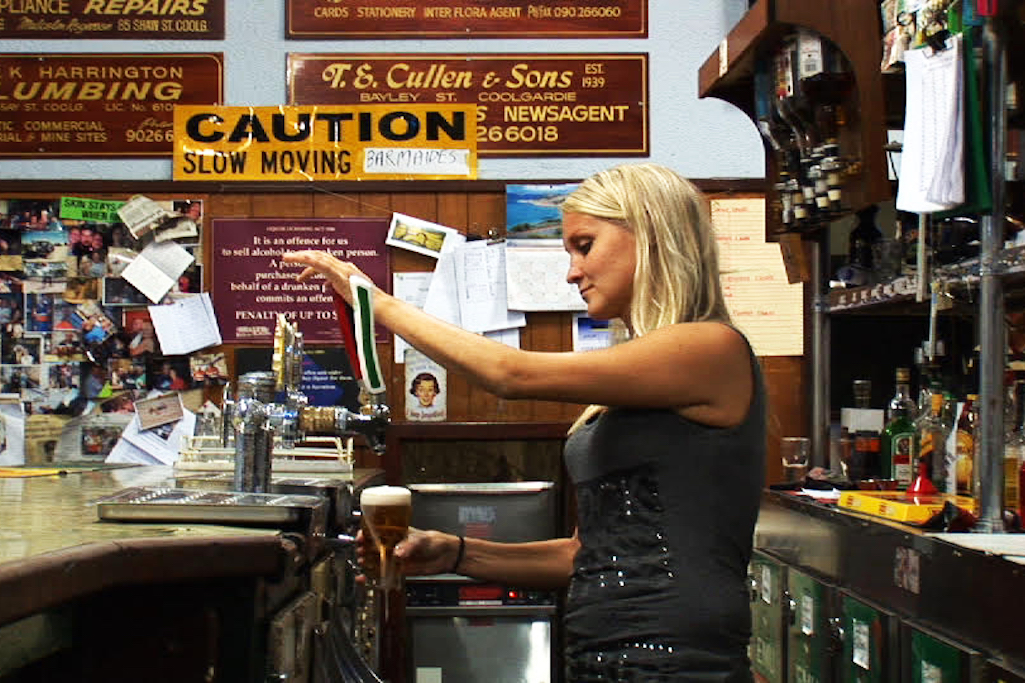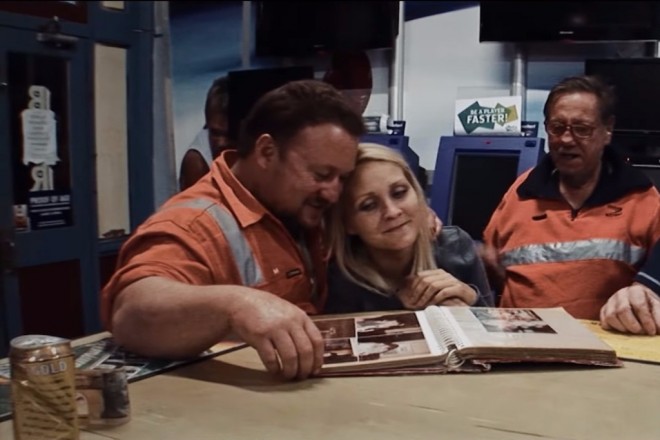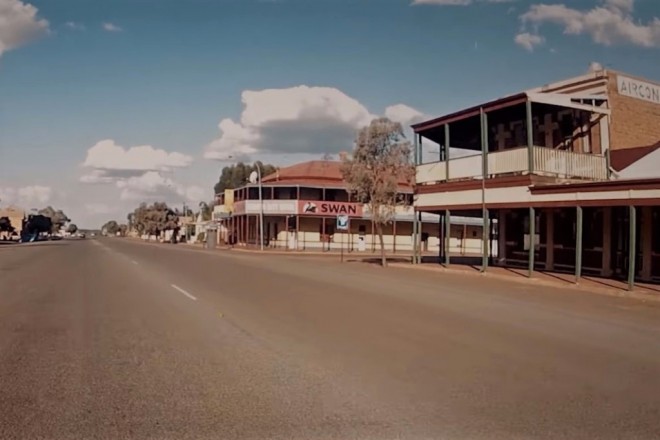This Controversial New Doco Exposes The Sexism And Punter Antics Of An Aussie Pub
We spoke to director Pete Gleeson.

Pete Gleeson, a documentary filmmaker from Perth, is a little nervous talking about his explosive new documentary, Hotel Coolgardie.
The film follows the misadventures of two Finnish backpackers, Steph and Lina, who spend three months working as barmaids in Coolgardie’s notorious Denver Hotel, in Goldfields, Western Australia. In Coolgardie the young women are confronted with a unique and often toxic mixture of alcohol, “accepted” sexism and disturbing pack mentality.
After the film premiered at festivals all around Australia, and internationally, viewers were talking about the darkness the film reveals and the condition of sexism in Australia. Goldfields residents (and the WA Tourism Board) were also up in arms about how the film “misrepresented” family-friendly Coolgardie.
The film certainly has made waves, but Pete is still reluctant to be too prescriptive about what the film exposes about sexism and the drinking culture in Australia. Still, he and producer Melissa Hayward (who is also Gleeson’s wife) are so proud of the film, it’s not hard to get them talking about its best, most engaging and extraordinarily shocking moments.
Junkee: What attracted you to Coolgardie and The Denver Hotel as a documentary subject?
Pete Gleeson: Well I had been out to that hotel, just passing through, when I worked out there for a couple of weeks many years ago, and I just thought it was a great little slice of outback Aussie life. It had this atmosphere where anything could happen. It was raucous and wild and, I guess, uncivilised in many ways, but it also had a charm to it as well.
It had these very interesting characters that would come and frequent the pub, and I was just interested in this kind of “man space” around the bar. I also noticed that whenever I would call back into the pub over the years there would be different women behind the bar. It’s this kind of convenient transaction between the publicans, who need labour, and these backpackers who stop for a few months, make a bit of money and move on.
“Barmaids are supposed to be ‘good sports’.”
So I thought: that’s a great little vehicle for us to explore both what these fresh faces coming into town mean to these guys, and these very masculine and often insular environments. And also what that environment would look like through these eyes of these women who would come and stay for a short time, who were obviously the subject of great attention from the men of the town. Whether or not they felt like that was part of the job, or whether they’d go out there and kind of unexpectedly be… fresh meat for the slaughter.
What do you think makes Steph and Lina so compelling?
Well it’s just that they were able to elicit all of these responses from the men that ranged from desire to total disdain. They drew boundaries fairly early; they didn’t adapt in the way the patrons of the pub expected them to. And I guess as soon as a conclusion was drawn about them, that they weren’t trying to fit in, or that they weren’t the “good sports” that barmaids are supposed to be, people kind of gave themselves licence to treat them anyway they wanted. All this stuff that was bubbling under the surface for the men came pouring out and was projected onto them.
They didn’t give much away, these Finnish girls. They were fairly blank-faced and they withdrew into themselves. So they became these blank canvases for the guys to project their issues onto.

How did the locals, and the women, react to you filming them?
They just sort of got used to it. We went out and filmed for a few weeks before the barmaids arrived, to get people used to us being there. The girls knew what to expect because we’d briefed them about it, and we started filming from as soon as they went to their interview. So the camera just became a kind of natural presence in the pub, and a natural accompaniment in the girls’ lives. We were embedded in the pub. It just became quite natural.
And, at the end of the day, a crew coming into that pub with a video camera wasn’t the most unusual thing that someone was going to see in any given day. There’s a lot of weird and wonderful and unusual stuff that goes on in a place like that. Some punters wielding a camera for a few weeks wasn’t considered anything too threatening or out of the ordinary.
And plus we were filming in a place where everyone was really comfortable in where they were, and who they were, and what they could and couldn’t do in this world that they had created. So we were kind of low on the pecking order. We were blow-ins coming along to make a film about something or other. And in the end it worked out really well because they didn’t really modify their behaviour and that’s what makes it strong is just this unbridled, unperformed behaviour that goes on.
The women were often put in situations that were quite extreme. Did you ever feel you’d have to step into a different role while you were filming?
We always kept an eye on them and made sure that they were coping ok. And even though the film is pretty intense and there’s some really intense moments — it’s a film. It’s been compressed from six weeks’ worth of footage. So there was time in between those moments for them to decompress, or reflect on what was happening, or make sure that they were safe and happy enough to be there.
“Humour is the great preserver of prejudice and sexism and misogyny.”
And in the end we did have to step in and provide some assistance once there were medical issues involved. But no, we were out there trying to capture actuality in a three-act structure, so we weren’t going to interrupt it if we didn’t have to. Unless, of course, someone was actually in physical danger.
What’s your perspective on the sexism you exposed in that environment, and what it says about Australian culture as a whole?
I think it says a lot about some of the underpinnings of our culture, and a lot about what is wrapped up in our sense of humour. Humour is the great preserver of prejudice and sexism and misogyny, and all those things. It’s this thing that you can kind of hedge your bets, you can say, “I’m only joking!” but it still preserves and maintains a certain status quo..
We don’t make a comment in the film about the sexism and the misogyny, but it is present. It’s there and it’s relentless. We leave it up to the audience to decide whether it reflects the appearance of Australia or not.

I was really struck by a comment that Lina made in the film about how the residents were “not depressed, but unhappy”. What’s your perspective on that?
Well there’s all these people trying to reach out and develop these relationships with [Lina]. And some of these guys, they’ve got a lot going for them in many ways. They’ve got sensitivity, and they’ve got spirit and charisma and all that. But there’s just something inside of them that’s unresolved, that’s not enabling them from being able to have real, healthy, respectful relationships.
And we don’t let these guys off the hook, because they make it the problem of the women, they project this stuff onto the women. But at the same time, we try and just show how they may have gotten to this place.
And if the film can do one thing for guys, hopefully it will show that you need to get your house in order first, before you can have a good, healthy relationship with somebody. You can’t drag all your baggage into a relationship and hope that it will work — or even hope that someone will respond and form a relationship with you when you’ve got all this simmering unresolved tension.
–
Hotel Coolgardie is in select cinemas now.
–
Matilda Dixon-Smith is Junkee’s Staff Writer. She tweets at @mdixonsmith.
–
Love film and TV? We’re holding our inaugural Video Junkee festival in July, a new annual event for lovers and creators of online video. Video Junkee is on July 28 & 29 at Carriageworks in Sydney, featuring keynotes, masterclasses, screenings, interviews and more. Tickets are on sale now.